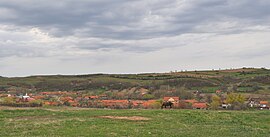Ohaba Lungă
Ohaba Lungă | |
|---|---|
 Overview of Ohaba Lungă | |
 Location in Timiș County | |
| Coordinates: 45°54′N 21°58′E / 45.900°N 21.967°E | |
| Country | Romania |
| County | Timiș |
| Government | |
| • Mayor (2020–2024) | Gigi Murărescu[1] (PSD) |
| Area | 104.79 km2 (40.46 sq mi) |
| Population (2021-12-01)[2] | 904 |
| • Density | 8.6/km2 (22/sq mi) |
| Time zone | EET/EEST (UTC+2/+3) |
| Postal code | 307300–307303 |
| Vehicle reg. | TM |
Ohaba Lungă (formerly Ohaba Românească; Hungarian: Hosszúszabadi; German: Langenau) is a commune in Timiș County, Romania. It is composed of four villages: Dubești, Ierșnic, Ohaba Lungă (commune seat) and Ohaba Română. Ohaba Lungă is one of the poorest and least populated communes in Timiș County.[3]
History[edit]
The first recorded mention of Ohaba Lungă dates from 1440.[4] In 1447 it belonged to Arad County and was the property of Miklós Bánffy.[5] Between 1597–1620 the commune comes into the successive possession of several noblemen, following royal donations (István Török, István Bethlen).[5] In the Turkish defters from the end of the 16th century and the beginning of the 17th century it is mentioned as Oláh-Ohaba or "Romanian Ohaba",[4] which proves the continuity of the Romanian character of the settlement. By 1890 it belongs to Bálinc District and has 357 inhabitants.[5]
Demographics[edit]
Ethnic composition (2011)[6]
Religious composition (2011)[7]
Ohaba Lungă had a population of 1,084 inhabitants at the 2011 census, down 12% from the 2002 census. Most inhabitants are Romanians (92.9%), larger minorities being represented by Ukrainians (2.31%) and Roma (1.11%). For 3.32% of the population, ethnicity is unknown.[6] By religion, most inhabitants are Orthodox (82.84%), but there are also minorities of Pentecostals (12.08%) and Baptists (1.48%). For 3.32% of the population, religious affiliation is unknown.[7]
| Census[8] | Ethnic composition | |||||
|---|---|---|---|---|---|---|
| Year | Population | Romanians | Hungarians | Germans | Roma | Ukrainians |
| 1880 | 2,492 | 2,456 | 12 | 21 | – | – |
| 1890 | 2,714 | 2,660 | 29 | 22 | – | – |
| 1900 | 2,822 | 2,751 | 44 | 19 | – | – |
| 1910 | 3,167 | 2,971 | 44 | 121 | – | – |
| 1920 | 2,855 | 2,807 | 10 | 34 | – | – |
| 1930 | 3,048 | 2,873 | 5 | 60 | 103 | – |
| 1941 | 3,130 | 2,970 | 2 | 30 | – | |
| 1956 | 2,744 | 2,646 | 8 | 3 | 87 | – |
| 1966 | 2,221 | 2,193 | 6 | 5 | – | – |
| 1977 | 1,681 | 1,647 | 2 | 1 | 24 | 7 |
| 1992 | 1,347 | 1,279 | 2 | 1 | 8 | 57 |
| 2002 | 1,225 | 1,168 | 10 | – | 35 | 12 |
| 2011 | 1,084 | 1,007 | 3 | – | 12 | 25 |
Gallery[edit]
-
Wooden church in Dubești
-
St. Paraskeva Orthodox church in Ierșnic
-
Church in Ohaba Română
References[edit]
- ^ "Results of the 2020 local elections". Central Electoral Bureau. Retrieved 16 June 2021.
- ^ "Populaţia rezidentă după grupa de vârstă, pe județe și municipii, orașe, comune, la 1 decembrie 2021" (XLS). National Institute of Statistics.
- ^ Sămânță, Marcel (18 February 2018). "Patru sate timișene bune pentru trai, dar…". Renașterea bănățeană.
- ^ a b Szabó, M. Attila (2003). Erdély, Bánság és Partium történeti és közigazgatási helységnévtára. Miercurea Ciuc: Pro-Print Kiadó.
- ^ a b c "Fișa Primăriei comunei Ohaba Lungă". Consiliul Județean Timiș.
- ^ a b "Tab8. Populația stabilă după etnie – județe, municipii, orașe, comune". Institutul Național de Statistică.
- ^ a b "Tab13. Populația stabilă după religie – județe, municipii, orașe, comune". Institutul Național de Statistică.
- ^ Varga, E. Árpád. "Temes megye településeinek etnikai (anyanyelvi/nemzetiségi) adatai 1880-2002" (PDF).





